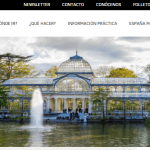Today, SEGITTUR presented its Practical Guide for Applying the Circular Economy in the tourism sector in Spain, as well as two manuals featuring a roadmap and best practices for tourism destinations and companies.
The Covid-19 crisis reinforced the importance of sustainability and the circular economy, while at the same time, it accelerated the change in the sector’s agenda of priorities and the obligation of not delaying the process of moving tourism towards a more balanced model, according to the Chairman of SEGITTUR, Enrique Martínez Marín.
Martinez Marin also asserted that “We are convinced that tourism will be circular or it will cease to exist. The system of manufacturing, using and throwing away is giving way to a system based on the circular economy, where the volume of waste is reduced and corporate efficiency, environmental quality and the sustainable development of tourism all improve, contributing to a more sustainable and balanced tourism model”.
The guide reviews the importance of the circular economy to the economy in general, and to the tourism sector, in particular, where cost savings for companies are quoted as being one of the main benefits for the sector, in addition to the reputational benefit and social welfare.
The guide establishes that the main levers for the deployment of the circular economy in the Spanish tourism sector include but are not limited to the 2030 Agenda for sustainable development, the Paris climate change agreement, the European Green Pact, the EU’s 2020 Circular Economy Action Plan or the Recovery, Transformation and Resilience Plan.
The report highlights the capacity of the tourism sector in Spain to trigger and stimulate the change in economic model not only in the subsectors that it is made up of, but also in other economic sectors, as it can act as a driving force and a catalyst for regeneration.
Circularity measures in tourism
The circularity measures proposed in the report for tourism include the following: reducing the use of energy and non-renewable resources, self-production of energy using renewable sources, choosing recycled consumer products, supplying local and seasonal products or minimising the generation of waste at tourist facilities.
It also includes the implementation of zero plastic waste policies, the optimised management of water and undertaking construction or restoration projects that facilitate the reuse and recycling of materials.
Finally, the report underlines that the transition towards a circular economy in the tourism sector requires the involvement of all the relevant stakeholders, particularly tourists and the local population.
During the presentation, the Local Government of Mallorca, the Environmental Technology Park of Mallorca, Iberostar, Fogar do Santiso and Abadía Retuerta also participated in sharing their best circular economy practices in destinations, hotels, restaurants and wineries.





